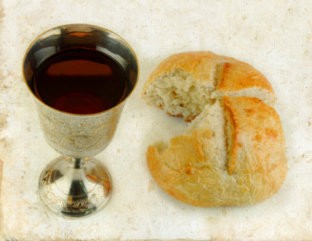Shared meal

World Communion Sunday is one of the best ideas Presbyterians ever had. The idea originated in the 1930s, a time of economic turmoil and fear and the rise of militaristic fascism abroad. Hugh Thomson Kerr, a beloved pastor in the Presbyterian Church, persuaded the denomination to designate one Sunday when American Christians would join brothers and sisters around the world at the Lord’s Table.
The idea caught on. Other denominations followed suit and the Federal Council of Churches (now the National Council of Churches) endorsed World Communion Sunday in 1940. But though the day is still noted in some denominational calendars and program materials, it doesn’t seem to be considered as important as it once was.
Read our latest issue or browse back issues.
Of course, every Sunday is in a sense World Communion Sunday insofar as many churches celebrate the Lord’s Supper every Sunday. But we do not welcome one another at the Lord’s Table. In some churches, a place at the table is reserved for members only. Some Lutherans exclude other Lutherans. And, of course, Eucharist is restricted in the Roman Catholic tradition (although individual Catholic clergy do not always adhere to their church’s teaching on this point).
I have heard all the ecclesiastical reasons for excluding people from the sacrament. I was once part of a Presbyterian delegation to a Reformed–Roman Catholic dialogue at the Vatican. Our delegation decided to gently raise the issue of sacramental exclusion. We agreed with our Catholic counterparts that the church has been given responsibility for the sacrament. As we pressed this issue, it became clear that we had not resolved disagreements about the nature of the church. Lewis Mudge, a Presbyterian theologian, spoke up: “You’re still saying that we are not a true church, aren’t you?” We remained, for them, an “ecclesial community,” not a church—so no sharing of communion.
I believe that when Jesus said, “Do this in remembrance of me,” he referred not only to the Last Supper but to his entire life of teaching, healing and welcoming all—a welcome so radical it scandalized religious leaders. I have never been able to square excluding a fellow Christian from the table and the meal that commemorates Jesus and that conveys, in bread and wine, something of his grace and love and forgiveness.
During a summer stint at a tiny church in Scotland, I had a visit from the pastor of the church in the next village who told me a communion story I will never forget.
He was an infantryman in the British army in World War II and ended up in a prisoner-of-war camp in Poland. The conditions were dreadful. There was no heat, and prisoners were given a single bowl of thin soup and a small crust of bread daily. Men were starving, sick, filthy and desperate. Suicide was a very real option. All one had to do was run toward the perimeter of the camp and leap against the barbed wire fence. Guards would immediately shoot and kill anyone trying to escape.
In the middle of the night he walked to the perimeter and sat down beside the fence to think about going through with it. He heard movement in the darkness from the other side of the fence. It was a Polish farmer. The man thrust his hand through the barbed wire and handed my friend half of a potato. In heavily accented English he said, “The Body of Christ.”
“Do this in remembrance of me.”







